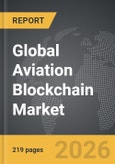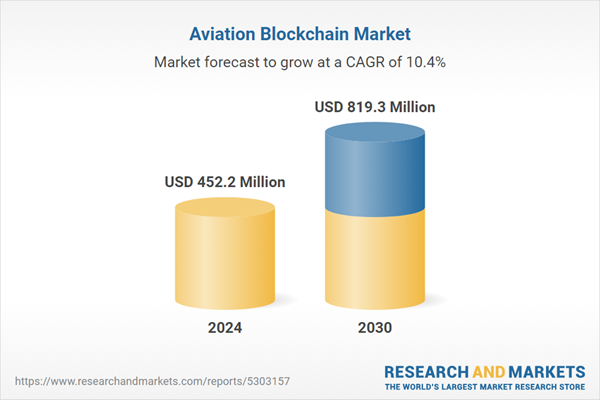Global Aviation Blockchain Market - Key Trends and Drivers Summarized
What Challenges in Aviation Can Blockchain Really Solve?
Blockchain technology, originally associated with cryptocurrencies, has recently found its footing in diverse industries, and aviation is no exception. But why is aviation turning to blockchain? For a sector with vast data exchanges and a complex web of stakeholders - from airlines and maintenance companies to regulatory bodies - the need for secure, transparent, and tamper-proof data storage and sharing is paramount. Blockchain's ability to create immutable records provides a powerful solution for data integrity issues in areas like ticketing, aircraft maintenance records, supply chain management, and passenger identification. With every aircraft requiring extensive tracking of parts and maintenance history, blockchain ensures each transaction, from part installation to servicing, is accurately logged. This feature can significantly reduce errors and fraud, thus improving safety and compliance. By enabling real-time, trusted communication between entities, blockchain eliminates the need for intermediaries, streamlining operations and cutting costs. This interest is why the adoption of blockchain in aviation is poised to address some of the industry's longstanding challenges, particularly around data transparency, operational efficiency, and regulatory compliance.Is Blockchain Aviation's Answer to Passenger Experience and Identity Verification?
With the expansion of global travel, ensuring a seamless and secure passenger experience has become a core objective in aviation, and blockchain technology is seen as a game-changer in this regard. Blockchain facilitates biometric-based identification, which allows for fast, reliable passenger processing, significantly reducing the time spent at check-in, boarding, and immigration. Passengers can be authenticated through a decentralized ledger, which securely stores information, such as biometric data, without risking privacy. This approach enhances the passenger experience, providing airlines with more time to offer personalized services. Additionally, by enabling airlines and airports to synchronize real-time data on bookings and cancellations, blockchain improves the overall responsiveness to passenger needs and provides real-time updates on flight status. Blockchain-based smart contracts also play a role by automating processes, like compensations for delayed flights, enhancing transparency in customer relations. Furthermore, a seamless, secure digital identity stored on a blockchain empowers passengers with greater control over their data, addressing the growing consumer demand for privacy and data security in an increasingly connected world.Can Blockchain Revolutionize Aviation's Supply Chain and Asset Tracking?
The aviation industry operates one of the most complex supply chains globally, encompassing thousands of suppliers, part manufacturers, and maintenance facilities. Blockchain offers a secure, decentralized system for tracking each component's lifecycle, from manufacturing to installation and disposal. This transparency reduces the risks of counterfeit parts and enables companies to trace parts in real-time, ensuring only certified, safe components are used in aircraft. A blockchain ledger ensures that maintenance records are accurately recorded, stored, and accessible to stakeholders, facilitating smoother inspections and compliance checks by regulatory authorities. Additionally, blockchain has applications in fuel management and carbon offset tracking, where airlines can verify sustainable fuel sourcing and track carbon credits. With increasing pressure for sustainability, blockchain offers airlines the ability to provide transparent records of emissions reductions, supporting their commitments to greener operations. By bridging information gaps and providing end-to-end traceability, blockchain enables more streamlined and sustainable asset management across the aviation ecosystem.What's Driving Growth in the Aviation Blockchain Market?
The growth in the aviation blockchain market is driven by several factors, each enhancing the operational, economic, and regulatory aspects of the industry. Increasing air travel demand, coupled with the complexity of data management across international borders, propels airlines to adopt blockchain for efficient data sharing and real-time tracking. Rising regulatory requirements for data integrity and security in sectors like maintenance, repair, and overhaul (MRO) are also pivotal drivers, as blockchain's immutable records ensure compliance with stringent aviation standards. In response to heightened customer expectations for seamless travel, airlines and airports are integrating blockchain to improve the passenger experience through quicker, secure identity verification and real-time data access. Consumer demand for sustainability is accelerating blockchain's role in supply chain transparency and carbon tracking, enabling airlines to verify and report eco-friendly practices. Meanwhile, the demand for predictive maintenance solutions drives the adoption of blockchain, as it facilitates more accurate maintenance planning by securely storing and analyzing data on wear-and-tear patterns. As blockchain continues to evolve, its applications in aviation are expanding, offering new avenues for cost efficiency, improved safety, and enhanced consumer satisfaction, which, collectively, fuel its growth in this transformative sector.Report Scope
The report analyzes the Aviation Blockchain market, presented in terms of market value (US$ Thousand). The analysis covers the key segments and geographic regions outlined below.- Segments: Function (Transactions, Record Keeping); Application (Passenger Identity Management, Cargo & Baggage Tracking, Flight & Crew Data Management, Supply Chain Management, Other Applications); End-Use (Airports, Airlines, Other End-Uses).
- Geographic Regions/Countries:World; United States; Canada; Japan; China; Europe (France; Germany; Italy; United Kingdom; and Rest of Europe); Asia-Pacific; Rest of World.
Key Insights:
- Market Growth: Understand the significant growth trajectory of the Transactions Function segment, which is expected to reach US$431.8 Million by 2030 with a CAGR of a 9.9%. The Record Keeping Function segment is also set to grow at 11% CAGR over the analysis period.
- Regional Analysis: Gain insights into the U.S. market, valued at $132.3 Million in 2024, and China, forecasted to grow at an impressive 9.6% CAGR to reach $141.3 Million by 2030. Discover growth trends in other key regions, including Japan, Canada, Germany, and the Asia-Pacific.
Why You Should Buy This Report:
- Detailed Market Analysis: Access a thorough analysis of the Global Aviation Blockchain Market, covering all major geographic regions and market segments.
- Competitive Insights: Get an overview of the competitive landscape, including the market presence of major players across different geographies.
- Future Trends and Drivers: Understand the key trends and drivers shaping the future of the Global Aviation Blockchain Market.
- Actionable Insights: Benefit from actionable insights that can help you identify new revenue opportunities and make strategic business decisions.
Key Questions Answered:
- How is the Global Aviation Blockchain Market expected to evolve by 2030?
- What are the main drivers and restraints affecting the market?
- Which market segments will grow the most over the forecast period?
- How will market shares for different regions and segments change by 2030?
- Who are the leading players in the market, and what are their prospects?
Report Features:
- Comprehensive Market Data: Independent analysis of annual sales and market forecasts in US$ Million from 2024 to 2030.
- In-Depth Regional Analysis: Detailed insights into key markets, including the U.S., China, Japan, Canada, Europe, Asia-Pacific, Latin America, Middle East, and Africa.
- Company Profiles: Coverage of players such as 14bis Supply Tracking (Safeflights Inc.), Aeron Labs, Avinoc LTD, Credits.Com Pte. LTD., Filament and more.
- Complimentary Updates: Receive free report updates for one year to keep you informed of the latest market developments.
Some of the 36 companies featured in this Aviation Blockchain market report include:
- 14bis Supply Tracking (Safeflights Inc.)
- Aeron Labs
- Avinoc LTD
- Credits.Com Pte. LTD.
- Filament
- IBM
- Infosys
- Insolar Technologies
- Leewayhertz Technologies
- Microsoft Corporation
This edition integrates the latest global trade and economic shifts into comprehensive market analysis. Key updates include:
- Tariff and Trade Impact: Insights into global tariff negotiations across 180+ countries, with analysis of supply chain turbulence, sourcing disruptions, and geographic realignment. Special focus on 2025 as a pivotal year for trade tensions, including updated perspectives on the Trump-era tariffs.
- Adjusted Forecasts and Analytics: Revised global and regional market forecasts through 2030, incorporating tariff effects, economic uncertainty, and structural changes in globalization. Includes historical analysis from 2015 to 2023.
- Strategic Market Dynamics: Evaluation of revised market prospects, regional outlooks, and key economic indicators such as population and urbanization trends.
- Innovation & Technology Trends: Latest developments in product and process innovation, emerging technologies, and key industry drivers shaping the competitive landscape.
- Competitive Intelligence: Updated global market share estimates for 2025, competitive positioning of major players (Strong/Active/Niche/Trivial), and refined focus on leading global brands and core players.
- Expert Insight & Commentary: Strategic analysis from economists, trade experts, and domain specialists to contextualize market shifts and identify emerging opportunities.
Table of Contents
Companies Mentioned (Partial List)
A selection of companies mentioned in this report includes, but is not limited to:
- 14bis Supply Tracking (Safeflights Inc.)
- Aeron Labs
- Avinoc LTD
- Credits.Com Pte. LTD.
- Filament
- IBM
- Infosys
- Insolar Technologies
- Leewayhertz Technologies
- Microsoft Corporation
Table Information
| Report Attribute | Details |
|---|---|
| No. of Pages | 219 |
| Published | February 2026 |
| Forecast Period | 2024 - 2030 |
| Estimated Market Value ( USD | $ 452.2 Million |
| Forecasted Market Value ( USD | $ 819.3 Million |
| Compound Annual Growth Rate | 10.4% |
| Regions Covered | Global |









